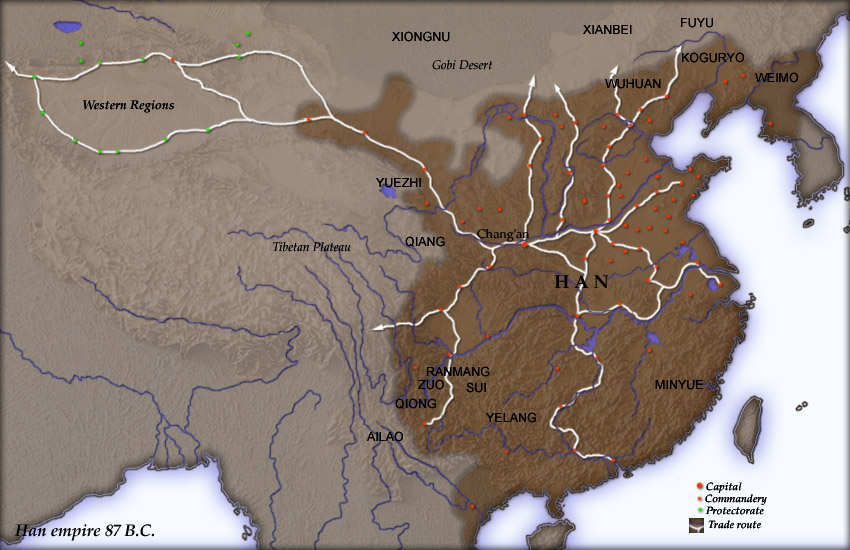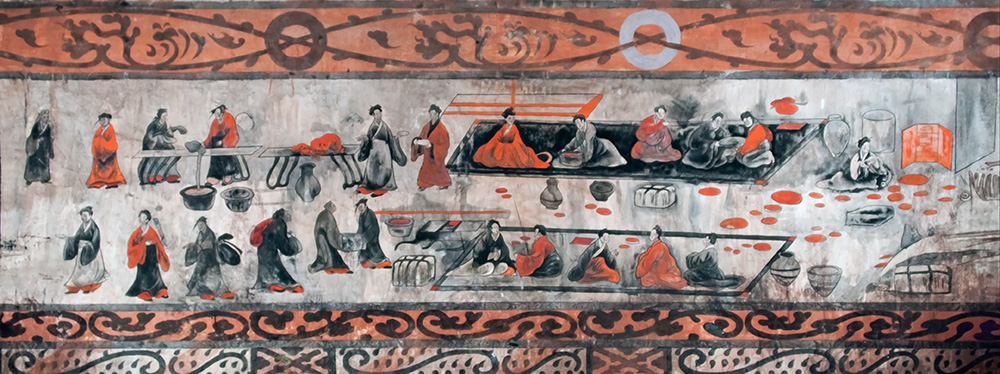|
Jucheer
Jucheer was a Xiongnu of unknown relationship to the royal dynastic lineage who succeeded Doulouchu in 147 AD. In 166 AD, Jucheer joined the Xianbei and Wuhuan in raiding Han territory. When the Wuhuan and Xiongnu were confronted by Han forces they immediately surrendered. Zhang Huan wanted to have Jucheer dismissed, but Emperor Huan of Han was unwilling to remove an established ruler and deemed Jucheer to be an innocent party forced into rebellion. Jucheer died in 172 AD and was succeeded by his son Tute Ruoshi Zhujiu Tute Ruoshi Zhujiu succeeded his father Jucheer as chanyu of the Xiongnu in 172 AD. In 177 AD, Tute and a contingent of horsemen took part in an expedition against the Xianbei. They were heavily defeated and only a quarter of their forces return .... Footnotes References * *Bichurin N.Ya., ''"Collection of information on peoples in Central Asia in ancient times"'', vol. 1, Sankt Petersburg, 1851, reprint Moscow-Leningrad, 1950 * * * * * *Taskin B.S., ''"Materia ... [...More Info...] [...Related Items...] OR: [Wikipedia] [Google] [Baidu] |
Tute Ruoshi Zhujiu
Tute Ruoshi Zhujiu succeeded his father Jucheer as chanyu of the Xiongnu in 172 AD. In 177 AD, Tute and a contingent of horsemen took part in an expedition against the Xianbei. They were heavily defeated and only a quarter of their forces returned alive. Tute died in 178 AD and was succeeded by his son Huzheng Huzheng succeeded his father Tute Ruoshi Zhujiu as chanyu of the Xiongnu in 178 AD. He was killed by the Han Emissary Zhang Xiu in 179 AD. The title of chanyu passed to the Western Tuqi Prince Qiangqu Qiangqu (; r. 179–188 AD) was the .... Footnotes References * *Bichurin N.Ya., ''"Collection of information on peoples in Central Asia in ancient times"'', vol. 1, Sankt Petersburg, 1851, reprint Moscow-Leningrad, 1950 * * * * * *Taskin B.S., ''"Materials on Sünnu history"'', Science, Moscow, 1968, p. 31 (In Russian) * {{s-end Chanyus ... [...More Info...] [...Related Items...] OR: [Wikipedia] [Google] [Baidu] |
Doulouchu
Doulouchu () was a Xiongnu prince of unknown relationship to the Southern Xiongnu dynastic line who was proclaimed chanyu by the Han dynasty in 143 AD. Toulouchu resided in the Southern Xiongnu capital of Meiji in Xihe Commandery. It is doubtful whether he wielded any real power over his nominal subjects. He died four years later in 147 AD and was succeeded by Jucheer Jucheer was a Xiongnu of unknown relationship to the royal dynastic lineage who succeeded Doulouchu in 147 AD. In 166 AD, Jucheer joined the Xianbei and Wuhuan in raiding Han territory. When the Wuhuan and Xiongnu were confronted by Han forces th .... His name might come from "Dol-uk", or "full understanding" in proto-Turkic. Footnotes References * *Bichurin N.Ya., ''"Collection of information on peoples in Central Asia in ancient times"'', vol. 1, Sankt Petersburg, 1851, reprint Moscow-Leningrad, 1950 * * * * * *Taskin B.S., ''"Materials on Sünnu history"'', Science, Moscow, 1968, p. 31 (In Russian) * ... [...More Info...] [...Related Items...] OR: [Wikipedia] [Google] [Baidu] |
Chanyu
Chanyu () or Shanyu (), short for Chengli Gutu Chanyu (), was the title used by the supreme rulers of Inner Asian nomads for eight centuries until superseded by the title "''Khagan''" in 402 CE. The title was most famously used by the ruling Luandi clan of the Xiongnu during the Qin dynasty (221–206 BCE) and Han dynasty (206 BCE–220 CE). It was later also used infrequently by the Chinese as a reference to Gokturk leaders. Etymology According to the ''Book of Han'', "the Xiongnu called the Tian, Heaven (天) ''Tengri, Chēnglí'' (撐犁) and they called a child (子) ''gūtú'' (孤塗). As for ''Chányú'' (單于), it is a "vast [and] great appearance" (廣大之貌).". L. Rogers and Edwin G. Pulleyblank argue that the title ''chanyu'' may be equivalent to the later attested title ''tarkhan'', suggesting that the Chinese pronunciation was originally ''dān-ĥwāĥ'', an approximation for ''*darxan''.Universität Bonn. Seminar für Sprach- und Kulturwissenschaft Zentra ... [...More Info...] [...Related Items...] OR: [Wikipedia] [Google] [Baidu] |
Xiongnu
The Xiongnu (, ) were a tribal confederation of nomadic peoples who, according to ancient Chinese sources, inhabited the eastern Eurasian Steppe from the 3rd century BC to the late 1st century AD. Modu Chanyu, the supreme leader after 209 BC, founded the Xiongnu Empire. After their previous rivals, the Yuezhi, migrated west into Central Asia during the 2nd century BC, the Xiongnu became a dominant power on the steppes of East Asia, centred on the Mongolian Plateau. The Xiongnu were also active in areas now part of Siberia, Inner Mongolia, Gansu and Xinjiang. Their relations with adjacent Chinese dynasties to the south-east were complex—alternating between various periods of peace, war, and subjugation. Ultimately, the Xiongnu were defeated by the Han dynasty in a centuries-long conflict, which led to the confederation splitting in two, and forcible resettlement of large numbers of Xiongnu within Han borders. During the Sixteen Kingdoms era, as one of the "Five B ... [...More Info...] [...Related Items...] OR: [Wikipedia] [Google] [Baidu] |
Xianbei
The Xianbei (; ) were a Proto-Mongolic ancient nomadic people that once resided in the eastern Eurasian steppes in what is today Mongolia, Inner Mongolia, and Northeastern China. They originated from the Donghu people who splintered into the Wuhuan and Xianbei when they were defeated by the Xiongnu at the end of the third century BC. The Xianbei were largely subordinate to larger nomadic powers and the Han dynasty until they gained prominence in 87 AD by killing the Xiongnu chanyu Youliu. However unlike the Xiongnu, the Xianbei state, Xianbei political structure lacked the organization to pose a concerted challenge to the Chinese for most of their time as a nomadic people. After suffering several defeats by the end of the Three Kingdoms, Three Kingdoms period, the Xianbei migrated south and settled in close proximity to Han society and submitted as vassals, being granted the titles of dukes. As the Xianbei Murong, Tuoba, and Duan tribes were one of the Five Barbarians who were ... [...More Info...] [...Related Items...] OR: [Wikipedia] [Google] [Baidu] |
Wuhuan
The Wuhuan (, < : *''ʔɑ-ɣuɑn'', < (c. 78 BCE): *''ʔâ-wân'' < *''Awar''Schuessler, Axel (2014) "Phonological Notes on Hàn Period Transcriptions of Foreign Names and Words" in ''Studies in Chinese and Sino-Tibetan Linguistics: Dialect, Phonology, Transcription and Text''. Series: Language and Linguistics Monograph. Issue 53. p. 257 of 249-292) were a who inhabited [...More Info...] [...Related Items...] OR: [Wikipedia] [Google] [Baidu] |
Han Dynasty
The Han dynasty (, ; ) was an imperial dynasty of China (202 BC – 9 AD, 25–220 AD), established by Liu Bang (Emperor Gao) and ruled by the House of Liu. The dynasty was preceded by the short-lived Qin dynasty (221–207 BC) and a warring interregnum known as the ChuHan contention (206–202 BC), and it was succeeded by the Three Kingdoms period (220–280 AD). The dynasty was briefly interrupted by the Xin dynasty (9–23 AD) established by usurping regent Wang Mang, and is thus separated into two periods—the Western Han (202 BC – 9 AD) and the Eastern Han (25–220 AD). Spanning over four centuries, the Han dynasty is considered a golden age in Chinese history, and it has influenced the identity of the Chinese civilization ever since. Modern China's majority ethnic group refers to themselves as the "Han people", the Sinitic language is known as "Han language", and the written Chinese is referred to as "Han characters". The emperor was at the pinnacle of ... [...More Info...] [...Related Items...] OR: [Wikipedia] [Google] [Baidu] |
Emperor Huan Of Han
Emperor Huan of Han (; 132 – 25 January 168) was the 27th emperor of the Han dynasty after he was enthroned by the Empress Dowager and her brother Liang Ji on 1 August 146. He was a great-grandson of Emperor Zhang. He was the 11th Emperor of the Eastern Han Dynasty. After Emperor Zhi was poisoned to death by the powerful official Liang Ji in 146, Liang Ji persuaded his sister, the regent Empress Dowager Liang to make the 14-year-old Liu Zhi, the Marquess of Liwu, who was betrothed to their sister Liang Nüying (), emperor. As the years went by, Emperor Huan, offended by Liang Ji's autocratic and violent nature, became determined to eliminate the Liang family with the help of eunuchs. Emperor Huan succeeded in removing Liang Ji in 159 but this only caused an increase in the influence of these eunuchs over all aspects of the government. Corruption during this period had reached a boiling point. In 166, university students rose up in protest against the government and calle ... [...More Info...] [...Related Items...] OR: [Wikipedia] [Google] [Baidu] |
Southern Xiongnu
The Xiongnu (, ) were a tribal confederation of nomads, nomadic peoples who, according to ancient Chinese historiography, Chinese sources, inhabited the eastern Eurasian Steppe from the 3rd century BC to the late 1st century AD. Modu Chanyu, the supreme leader after 209 BC, founded the Xiongnu Empire. After their previous rivals, the Yuezhi, migrated west into Central Asia during the 2nd century BC, the Xiongnu became a dominant power on the steppes of East Asia, centred on the Mongolian Plateau. The Xiongnu were also active in areas now part of Siberia, Inner Mongolia, Gansu and Xinjiang. Their relations with adjacent Dynasties in Chinese history, Chinese dynasties to the south-east were complex—alternating between various periods of peace, war, and subjugation. Ultimately, the Xiongnu were defeated by the Han dynasty Han–Xiongnu War, in a centuries-long conflict, which led to the confederation splitting in two, and forcible resettlement of large numbers of Xiongnu ... [...More Info...] [...Related Items...] OR: [Wikipedia] [Google] [Baidu] |






